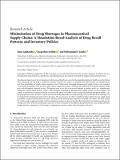| dc.contributor.author | Azghandi, Rana | |
| dc.contributor.author | Griffin, Jacqueline | |
| dc.contributor.author | Jalali, Seyed Mohammad Javad | |
| dc.date.accessioned | 2018-12-03T18:08:11Z | |
| dc.date.available | 2018-12-03T18:08:11Z | |
| dc.date.issued | 2018-12 | |
| dc.date.submitted | 2018-09 | |
| dc.identifier.issn | 1076-2787 | |
| dc.identifier.issn | 1099-0526 | |
| dc.identifier.uri | http://hdl.handle.net/1721.1/119395 | |
| dc.description.abstract | The drug shortage crisis in the last decade not only increased health care costs but also jeopardized patients’ health across the United States. Ensuring that any drug is available to patients at health care centers is a problem that official health care administrators and other stakeholders of supply chains continue to face. Furthermore, managing pharmaceutical supply chains is very complex, as inevitable disruptions occur in these supply chains (exogenous factors), which are then followed by decisions members make after such disruptions (internal factors). Disruptions may occur due to increased demand, a product recall, or a manufacturer disruption, among which product recalls—which happens frequently in pharmaceutical supply chains—are least studied. We employ a mathematical simulation model to examine the effects of product recalls considering different disruption profiles, e.g., the propagation in time and space, and the interactions of decision makers on drug shortages to ascertain how these shortages can be mitigated by changing inventory policy decisions. We also measure the effects of different policy approaches on supply chain disruptions, using two performance measures: inventory levels and shortages of products at health care centers. We then analyze the results using an approach similar to data envelopment analysis to characterize the efficient frontier (best inventory policies) for varying cost ratios of the two performance measures as they correspond to the different disruption patterns. This analysis provides insights into the consequences of choosing an inappropriate inventory policy when disruptions take place. | en_US |
| dc.publisher | Hindawi Publishing Corporation | en_US |
| dc.relation.isversionof | http://dx.doi.org/10.1155/2018/6348413 | en_US |
| dc.rights | Creative Commons Attribution | en_US |
| dc.rights.uri | http://creativecommons.org/licenses/by/4.0/ | en_US |
| dc.source | Hindawi Publishing Corporation | en_US |
| dc.title | Minimization of Drug Shortages in Pharmaceutical Supply Chains: A Simulation-Based Analysis of Drug Recall Patterns and Inventory Policies | en_US |
| dc.type | Article | en_US |
| dc.identifier.citation | Azghandi, Rana, Jacqueline Griffin and Mohammad S. Jalali. "Minimization of Drug Shortages in Pharmaceutical Supply Chains: A Simulation-Based Analysis of Drug Recall Patterns and Inventory Policies." Complexity, volume 2018 (6348413):1-14. | en_US |
| dc.contributor.department | Sloan School of Management | en_US |
| dc.contributor.mitauthor | Jalali, Seyed Mohammad Javad | |
| dc.relation.journal | Complexity | en_US |
| dc.eprint.version | Final published version | en_US |
| dc.type.uri | http://purl.org/eprint/type/JournalArticle | en_US |
| eprint.status | http://purl.org/eprint/status/PeerReviewed | en_US |
| dc.date.updated | 2018-12-02T06:56:41Z | |
| dc.language.rfc3066 | en | |
| dc.rights.holder | Copyright © 2018 Rana Azghandi et al. This is an open access article distributed under the Creative Commons Attribution License, which permits unrestricted use, distribution, and reproduction in any medium, provided the original work is properly cited. | |
| dspace.orderedauthors | Azghandi, Rana; Griffin, Jacqueline; Jalali, Mohammad S. | en_US |
| dspace.embargo.terms | N | en_US |
| dc.identifier.orcid | https://orcid.org/0000-0001-6769-2732 | |
| mit.license | PUBLISHER_CC | en_US |
